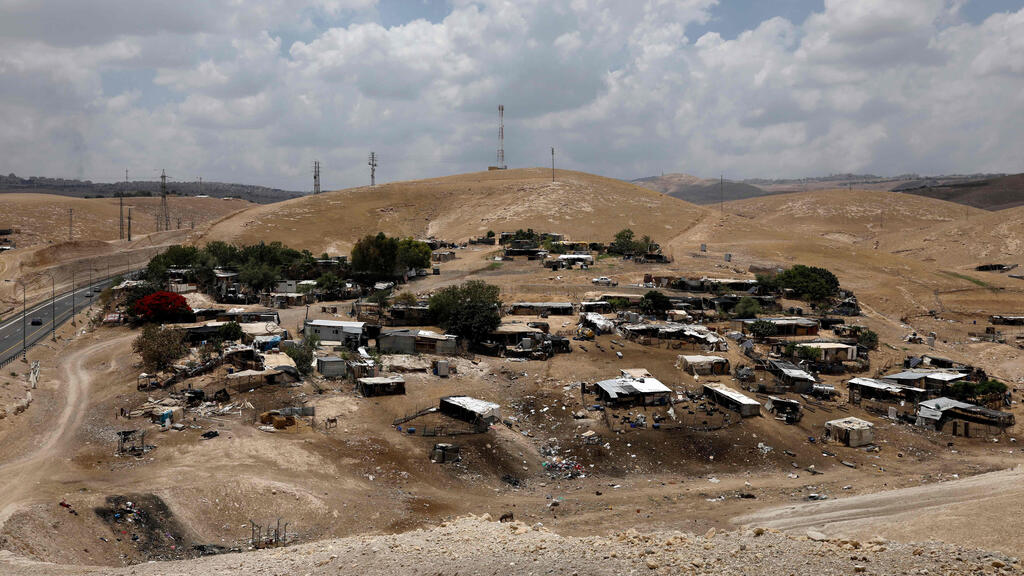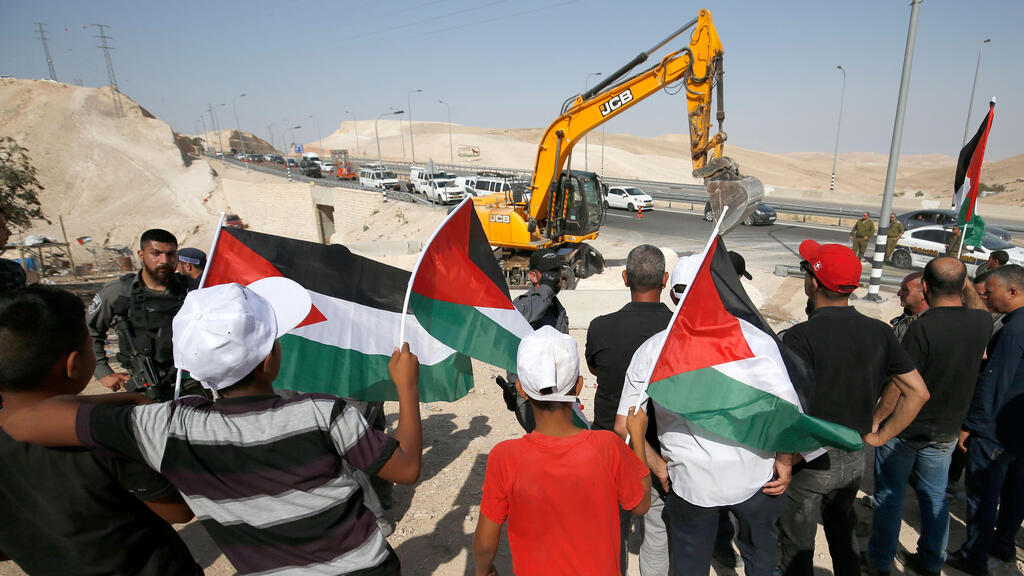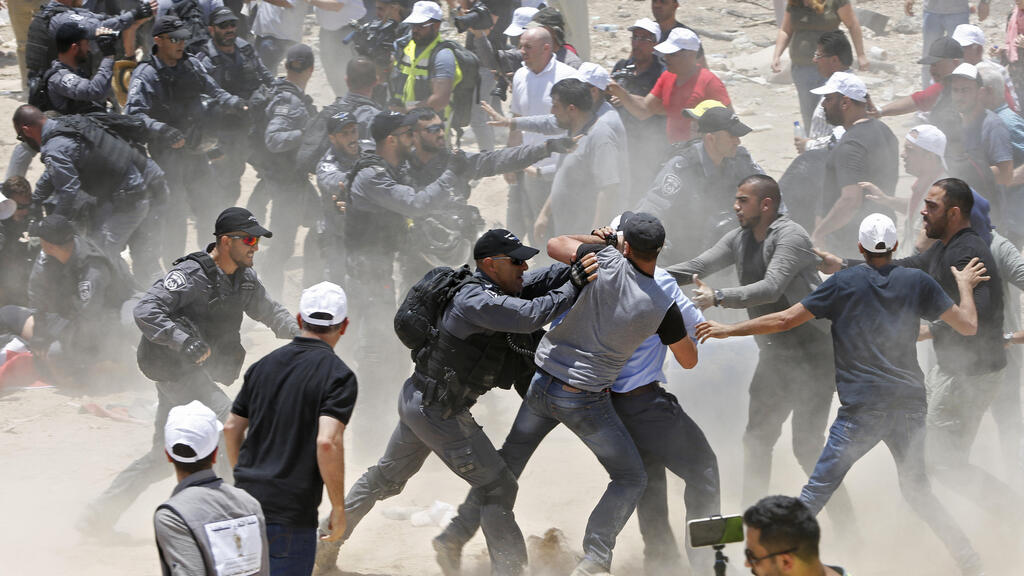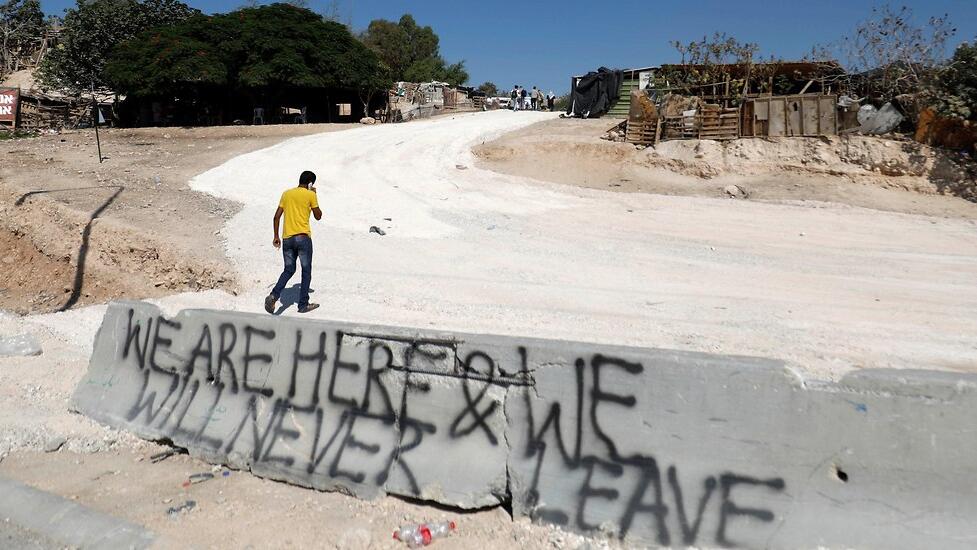Protesters streaming up the windswept hills east of Jerusalem interrupted Maha Ali’s breakfast.
Palestinian chants of support for her West Bank Bedouin community of Khan al-Ahmar, at risk of demolition by the Israeli army since it lost its legal protection over four years ago, drowned out the singing birds and bleating sheep.
While intended to encourage the village, last week’s solidarity rally unsettled Ali. Israeli politicians assembled on the opposite hill for a counter protest, calling for Khan al-Ahmar’s immediate evacuation.
“Why are they all back here now? Did something happen?” Ali asked her sister, gazing toward a swarm of TV journalists. “Four years of quiet and now this chaos again.”
The long-running dispute over Khan al-Ahmar has resurfaced as a focus of the Israeli-Palestinian conflict, with a legal deadline looming and Israel’s new far-right ministers pushing the government to fulfill a Supreme Court-sanctioned commitment from 2018 to wipe the village off the map. Israel contends that the hamlet, home to nearly 200 Palestinians and an EU-funded school, was built illegally on state land.
For Palestinians, Khan al-Ahmar is emblematic of the latest stage of the decades-long conflict, as thousands of Palestinians struggle for Israeli permission to build in the 60% of the West Bank over which the Israeli military has control.
After a spasm of violence last week — including the deadliest Israeli raid in the West Bank for two decades and the deadliest Palestinian attack on civilians in Jerusalem since 2008 — Prime Minister Benjamin Netanyahu responded Saturday with a vow to strengthen Jewish settlements in the Israeli-controlled part of the West Bank, where little land is allocated to Palestinians.
The competition for land is playing out in the southern Hebron hills — where the Supreme Court has ordered the expulsion of a thousand Palestinians in an area known as Masafer Yatta — and across the territory. In unauthorized Palestinian villages — without direct access to Israeli power, water or sewage infrastructure
News of Khan al-Ahmar’s impending mass eviction four years ago sparked widespread backlash. Since then, the government has stalled, asking the court for more time due to international pressure and Israel’s repeatedly deadlocked elections.
“They say the bulldozers will come tomorrow, next month, next year,” said Ali, 40, from her metal-topped shed, where she can see the red-roofed homes of the fast-growing Kfar Adumim settlement. “Our life is frozen.”
On Wednesday, the Israeli government is expected to respond to a petition by a pro-settler group, Regavim, asking the Supreme Court why Khan al-Ahmar has not yet been razed. Residents fear the brakes may be off now that Israel has its most right-wing government in history.
Regavim’s co-founder, Bezalel Smotrich, is now Israel’s ultra-nationalist finance minister. In a contentious coalition deal, he was given control over an Israeli military body that oversees construction and demolition in Israeli-administered parts of the West Bank.
At a Cabinet meeting last week, Israel’s national security minister, Itamar Ben-Gvir, demanded that Khan al-Ahmar be demolished “just as the defense minister chose to destroy a Jewish outpost” built illegally in the West Bank.
“It’s not just about Khan al-Ahmar, it’s about the future of Judea and Samaria,” Yuli Edelstein, chairman of the parliament’s foreign and defense committee said during a visit to the village last week, using the biblical names for the West Bank.
Khan al-Ahmar’s leader, 56-year-old Eid Abu Khamis, said anxiety has returned to his cluster of shacks. “They want to empty the land and give to settlers,” he said.
Bedouins have made Khan al-Ahmar their home since at least the 1970s, though some, like Ali and Abu Khamis, say their parents lived there earlier. Israel has offered to resettle the villagers at another site several miles away. Palestinians fear Israel will use the strategic strip of land to slice Jerusalem off from Palestinian cities, making a future Palestinian state non-viable.
“We are trying to counter this in every way we can,” said Ahmad Majdalani, the Palestinian Authority’s minister of social development. “The new government will find itself in direct confrontation with us and the international community.”
The U.S. government has raised concerns about planned evictions of Palestinians in the West Bank with the Israeli government, said the U.S. Office of Palestinian Affairs, referring to the cases of Khan al-Ahmar and Masafer Yatta in what is known as Area C.
The zone covers 60% of the West Bank designated as being under full Israeli control. This is in contrast to the remaining areas, including Palestinian population centers, where the Palestinian autonomy government exercises civil and partial security control.
This demarcation of different zones was part of the 1995 Oslo peace accords.
It was an interim agreement, meant to last five years pending a final peace deal.
“The intention was always that the lion’s share of Area C will be part of the Palestinian state,” said Yossi Beilin, an architect of those peace accords. “Otherwise, it’s like holding people in a prison, and eventually, there would be an explosion.”
Nearly three decades later, Area C is home to some half-million Israelis in dozens of settlements considered illegal under international law. They live alongside between 180,000-300,000 Palestinians, the U.N. estimates, who are almost never granted permits to build. When they build homes without permits, military bulldozers level them.





